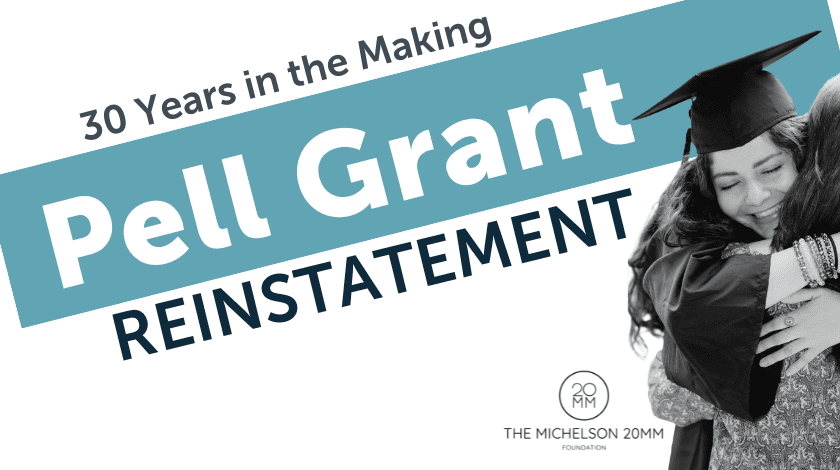By Kenia Miranda Verdugo
1994 marked a pivotal year in the United States’ tough-on-crime history with the passing of the Violent Crime Control and Law Enforcement Act, paving the way for the elimination of Pell Grant eligibility for people in prison while ending the majority of prison education programs. The legacy of this crime bill is considered to be one of the cornerstone statutes that accelerated mass incarceration. States and localities were incentivized, through federal funding, to build more jails and prisons and enact other punitive measures that also increased the number and length of prison sentences and reduced the possibility of early release for incarcerated individuals.
Although this crime bill happened 30 years ago, the monster machine this bill created and preserved continues to spin its wheels. The same funding streams that support enforcement activities as opposed to preventative measures continue to this day, albeit with tweaks. States still look to build new jails and prison facilities, even as crime rates remain near historic lows. Shifting away from the infrastructure created by the crime bill is not so simple, especially because much of the American public equates public safety with policing, prosecutions, jails, and prisons. Polling shows that despite significant drops in the crime rate, the majority of the general public believes that crime has gotten worse. In 2015, the Obama administration reinstated Pell Grants to a limited number of incarcerated students seeking college degrees. Findings from this pilot program further proved that education reduces recidivism.
Nearly 30 years later, as many as 700,000 individuals in prison will become eligible for financial aid thanks to Pell Grant reinstatement—a policy change that has the potential to open up new college opportunities all across the country. Studies show that higher education in prison decreases recidivism and increases the chance of becoming employed after release. Although educating incarcerated individuals has proven to have many benefits, the new access to financial aid also comes with unanswered questions and limitations. For example, Pell Grants can only be leveraged at prisons with existing Pell-eligible college programs. Additionally, incarcerated students face a number of challenges when completing the FAFSA to determine aid eligibility due to a lack of access to personal files and tax records, difficulty rehabilitating defaulted federal loans, and limited access to phone and email to obtain and communicate with family members about necessary documentation, among other things. Given the lack of information, more college structures need to be built and departments of correction must figure out how to best support their incarcerated students.
California has begun to lead the way for the nation to protect incarcerated students from for-profit universities that only seek to tap into these newly available funds and offer no proper education. A bill in only one state, SB 416 underscores the need to ensure that the rest of the nation’s incarcerated students are also protected and given quality, accredited education. This new policy is also applicable as prisons and colleges are still recovering from the COVID-19 pandemic, which still hinders the prisons ability to expand educational and face-to-face programming.
While reinstating Pell Grants for incarcerated students is a step in the right direction to expand educational opportunities for those in prison, it alone is not sufficient to address the broader challenges faced by this population. Pell Grants provide financial aid for tuition, they do not address the systemic barriers that incarcerated individuals encounter in accessing quality education. Prisons often lack adequate resources and infrastructure to offer comprehensive educational programs, limiting the range of courses and degrees available to students. Additionally, the lack of qualified instructors and limited access to technology and educational materials further hampers the effectiveness of educational initiatives in prisons. Thus, without comprehensive reforms that address these structural issues, reinstating Pell Grants alone will not be enough to provide incarcerated students with the necessary tools and resources to succeed academically.
Furthermore, the reintegration of incarcerated individuals into society upon their release poses another significant challenge that Pell Grants alone cannot address. While education is vital for skill-building and personal development, successful reentry requires a holistic approach that includes support services, job training, and access to employment opportunities. Many incarcerated individuals face numerous social and economic barriers upon release, including stigma, limited job prospects, and lack of housing and support networks. Without comprehensive reentry programs that go beyond educational opportunities, the potential impact of Pell Grants may be diminished.
To truly expand educational opportunities for students in prison, a multi-faceted approach that encompasses not only financial aid but also comprehensive support services and post-release programs is crucial. As Pell reinstatement advances higher education in prison and reduces recidivism, the Michelson 20MM Foundation looks forward to working with our partners as we continue to center the needs of incarcerated students. Priority areas include expanding educational programming in prisons in order to reduce wait lists and increase the degrees offered, creating and holding partnerships with local regional and accredited colleges, and preparing colleges for this growing influx of unique students who don’t have the same access as students on campus. Together, we will strive to ensure that reinstating Pell Grants has the transformative impact for which we all hope.
Michelson 20MM is a private, nonprofit foundation working toward equity for underserved and historically underrepresented communities by expanding access to educational and employment opportunities, increasing affordability of educational programs, and ensuring the necessary supports are in place for individuals to thrive. To do so, we work in the following verticals: Digital Equity, Intellectual Property, Smart Justice, Student Basic Needs, and Open Educational Resources (OER). Co-chaired and funded by Alya and Gary Michelson, Michelson 20MM is part of the Michelson Philanthropies network of foundations.
To sign up for our newsletter, click here.
